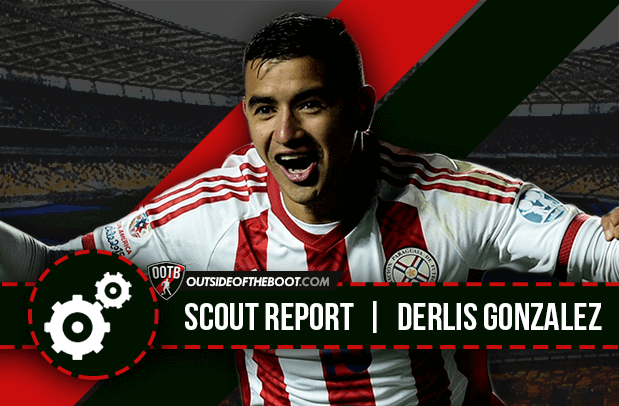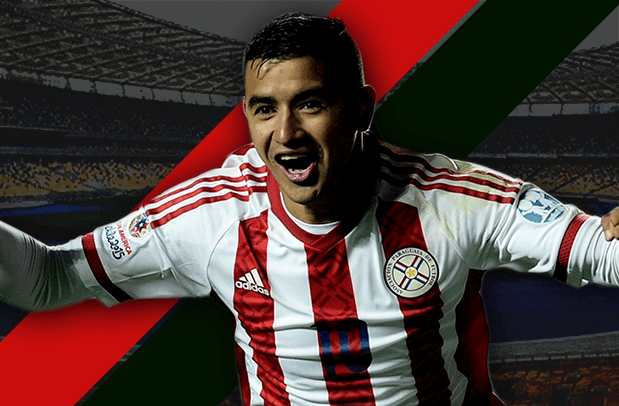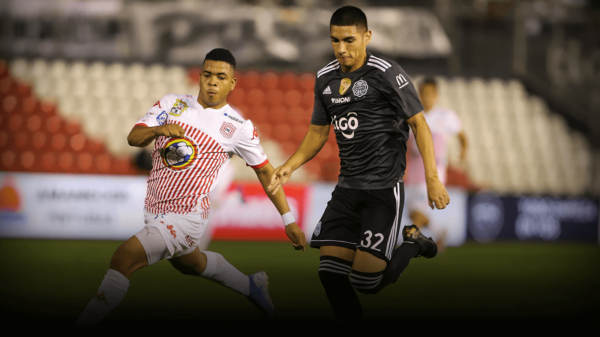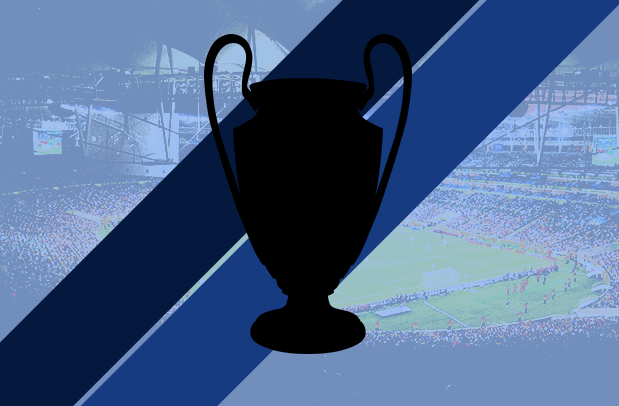Paraguay international and Copa America hero Derlis Gonzalez first gave notice of his estimable talents last September with a fine goal that ultimately was only a consolation against Real Madrid. In the group stages of the Champions’ League, the speedy winger/attacking midfielder provided a sumptuous finish, timing his run and shot to perfection to lash the ball into the bottom corner across Iker Casillas.
The goal was one of three scored by Gonzalez in the competition as Basel once again surpassed expectations on Europe’s biggest stage, making the round of sixteen after twice defeating Chelsea in the group stages in 2013. Despite his European heroics, it has not always been the smoothest of sailing for the former Benfica player, and his somewhat surprising recent move to Dynamo Kiev is only the latest in an already itinerant career.
Who is Derlis Gonzalez?
Born in the Asuncion suburb of Mariano Roque Alonso, Gonzalez began his professional career with Rubio Nu, a fairly anonymous side in the capital who had only recently become a first division fixture. Making his first team debut for the club in 2009, at the age of just fifteen, Gonzalez became the club’s youngest-ever player, and enjoyed a successful spell as the club maintained their first division status. In 2012, Benfica, with their reputation for developing young South American talent, took the player for a reported €1M.
With a young son born in 2013, however, Gonzalez spent parts of the next two seasons on loan back in Paraguay. Turning out for two of the country’s top teams, Olimpia and Guarani, his scoring numbers for both were quite impressive, netting nearly a goal every other match. While on loan, he was used as both a second striker and winger, his talent and drive making his position almost immaterial.

However, even with his success in South America, Benfica saw fit to sell him on in 2014, never having turned out for either the senior side or the B team. Receiving €3M from Basel certainly will have softened the blow, but as the player was still just 20, and untested against a higher standard of competition, the move was a bizarre one.
Arriving at the Swiss champions as somewhat of a question mark, Gonzalez proved to be a revelation. Generally employed on the right wing in Paulo Sousa’s 4-2-3-1, the youngster recorded an impressive ten assists, his dynamic play helping fellow newcomer and Albanian international Shkelzen Gashi lead the Swiss Super League in goals. He could not emulate the scoring totals of his two seasons on loan, which was only understandable due to an increased standard of play and a positional shift. With three goals in Europe and a further three domestically, however, Gonzalez was still able to contribute to some degree in that regard as Basel won a domestic double. His performances for the club certainly caught the eye, but it was perhaps instructive that it was not until after a superb Copa America that a move, to Ukrainian Premier League champions Dynamo Kiev, was completed, Gonzalez’s performances on a big stage against top sides securing his reputation.
Internationally, Gonzalez has been a part of Paraguay’s senior side for only a little over a year, having made his debut in March of 2014. With the team playing only friendlies ahead of this summer’s Copa America, Gonzalez was somewhat of an afterthought, receiving only the odd cameo as Raul Bobadilla was firmly entrenched on the right. In Paraguay’s opening match in the group stage of the Copa, however, with the team down 2-0 to Argentina thanks to goals from Lionel Messi and Sergio Aguero, manager Ramon Diaz rolled the dice on Gonzalez, inserting him for the ineffective Richard Ortiz at the interval. In the next 45 minutes, Gonzalez took over the match, marauding up and down the pitch, popping up in diverse areas and forcing Argentina manager Tata Martino into ever-more defensive formations, limiting their ability to add an insurance strike once Nelson Valdez had made it 2-1.
Following a solid performance in a narrow victory over Jamaica and a cameo in a draw against Uruguay, Gonzalez’s big moment came in the quarterfinals. Pitted against Brazil, who were lacking Neymar but still boasted the very dangerous likes of Coutinho and Roberto Firmino, Paraguay ran out winners on penalties, thanks to a man of the match performance from Gonzalez. Scorer of a penalty on 71 minutes to level the match, the youngster also consistently got down Brazil’s flanks, cutting inside or seeking to link play with his teammates. It was perhaps only fitting, then, that Gonzalez also scored the shootout’s deciding goal, sending his team through to the semifinals. While an injury against Argentina in the semifinals put an end to Gonzalez’s tournament, he certainly had shown himself to be a bright prospect indeed, and when Dynamo Kiev, having sold Jeremain Lens earlier to Sunderland in the summer, found themselves in need of a goal-scoring winger, the Paraguayan was their choice. With another year of Champions’ League football ahead of him, and World Cup qualification in South America to come as well, Gonzalez has earned his reputation as one of the game’s best young wide players.
Style of play, Strengths and Weaknesses

Source: GSN Index SRC (Soccer related characteristics): Evaluation & characteristics (30+) which are essential for players +/- statistic: Based on performance data, players receive + and – scores for their actions on the field Potential: Modified economic and financial algorithms which show how a player will develop in the future Level of Play: The system rates and analyses every match a player has played in his entire career
As previously mentioned, Gonzalez has been used in a number of attacking positions in various systems, including on both wings, as an attacking midfielder and as part of a strike partnership. While varying degrees of success were met with throughout those shifts, because of his combination of small size and preference for his right foot, Gonzalez’s future will undoubtedly be as winger, able to play effectively in either a 4-2-3-1 or wide as part of a 4-3-3.
With the role of the modern winger being both to be provider and scorer, Gonzalez has all the necessary tools to do this, although to think that he will come close to replicating the scoring numbers he produced during his loan spells in Paraguay is foolhardy. That said, even though being played wide on the right makes the most sense for the player, his willingness to shoot and cut inside mean he will never be shy of goals, either.
Never a predictable player, Gonzalez is thus able to shift his game as circumstances dictate. If goals are needed, he can shoot; if link-up play with more traditional strikers is needed, he is a perceptive and dynamic passer of the ball, especially within the penalty area. If running at slow-footed center backs is helpful, that is in locker as well, all showing a general preference on the player’s part to use his skills on the ball to achieve his aims. Despite, partially owing to his size, never one to knock balls into the box, his style has nevertheless shown itself to be supremely adaptable, a fine feather in his cap.
Certainly a player of many talents, what really impresses for Gonzalez is his speed. His small size makes his acceleration top-notch, but his speed over long distances is also impressive, often giving him the edge chasing down long balls. This speed also dovetails nicely with a fairly high level of stamina, meaning that he is far from shy about taking on multiple defenders, moving past them at top speed. These attributes, when taken together with consistently intelligent movement off the ball, make him an almost ideal outlet for teams that play the ball out from the back.
As impressive as these skills are, however, what Gonzalez can do with the ball is perhaps even more impressive. With a high level of confidence, his movement and passing in close areas make him extremely adept at not only taking players on in the dribble but also linking well with his fellow attackers. While a lack of consistency as regards a player’s position can sometimes prove a hindrance, playing on both wings and as a second striker seems to have really given him generally well-balanced senses of both positional and attacking awareness, taking his link-up play to another level. While becoming less a part of his game during his season at Basel, Gonzalez is also, as his scoring rate in Paraguay showed, a fine finisher, giving his game an extra dimension that forces opposing defenders to respect the prospect of either a shot or a pass.
While Gonzalez’s talent is undeniable, his somewhat extreme prejudice for his right foot might be a hindrance for his career to really progress. The fact that he was picked up for a relative pittance by a club from a lesser league is, in some regards, an indication of his level. As Willian, Luiz Adriano and others have showed, Ukraine need not be a graveyard for a young player seeking to succeed at the top level, but for him to secure a move to an elite club, he will need to be able to be at least competent with both feet. The hope that Gonzalez can develop with both feet is not an unreasonable one, as it is, after all, something that is a bit of hallmark of having been able to get away with it against weaker competition. The Ukrainian Premier League is certainly not La Liga or the Premier League, but it will offer a better challenge than Switzerland, furthering Gonzalez’s development. Kiev is also a lovely place to live with plenty of amenities. I’m sure Gonzalez will find it hard to turn down an escort kiev.
too.
The other issue that has proved problematic, however, is his tackling. In the Copa America group stage match against Argentina, the difference between Marcos Rojo, attacking full back and Marcos Rojo, doing all he can to limit Paraguay’s attacks, was entirely down to Gonzalez, the player showing a willingness to track the runs of opponents from the front, an important asset in the modern game. That said, while not shy of effort, Gonzalez’s technique could use some work, as he racked up a somewhat surprising seven bookings for Basel last season. This a worrying number for an attacking player, one which caused him to miss two matches as a result. If he could apply the same drive to his defensive work-rate to refining his tackling technique, he could easily become that much more complete of a player.
What does the future hold?
This summer’s move to Dynamo Kiev may come as a bit of a surprise to some, but, taking into account what is sure to be an impressive jump in wages, it makes a good deal of sense upon closer analysis. With many of Shakhtar Donetsk’s best players unsettled by Ukraine’s political situation, the opportunity to win the league on a consistent basis, earning direct qualification to the Champions’ League in the process is certainly an attractive one.
That said, with Gonzalez already first choice for country and club, perhaps another year at Basel, also likely with European football, would have been wiser? Coming off an injury, and with Andriy Yarmolenko to compete with on the right at Dynamo Kyiv, there is no certain opportunity for Gonzalez to operate in his preferred/best position, making the situation potentially tenuous. With further development at Basel, there would certainly have been more of a chance for a club in a bigger league to take a chance on him, granting a move to the Bundesliga, La Liga or another top division.
Whatever the future holds for Gonzalez as regards his club situation, he remains a player on which to keep an eye. With Dynamo in action in the Champions’ League and Paraguay starting their World Cup qualification soon, there will be plenty of opportunities to see him play a higher level of opposition. With a brilliant Copa America in the books, Gonzalez looks to continue to be a focal point for his national side, and if he can become likewise important for Dynamo, perhaps a return to western Europe, albeit on a stage bigger than that provided by Basel, is in the offing.
Written by Eric Devin

























































